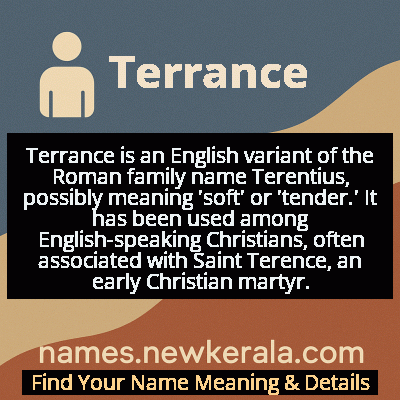Terrance Name Meaning & Details
Origin, Popularity, Numerology Analysis & Name Meaning of Terrance
Discover the origin, meaning, and cultural significance of the name TERRANCE. Delve into its historical roots and explore the lasting impact it has had on communities and traditions.
Name
Terrance
Gender
Male
Origin
Christian
Lucky Number
3
Meaning of the Name - Terrance
Terrance is an English variant of the Roman family name Terentius, possibly meaning 'soft' or 'tender.' It has been used among English-speaking Christians, often associated with Saint Terence, an early Christian martyr.
Terrance - Complete Numerology Analysis
Your Numerology Number
Based on Pythagorean Numerology System
Ruling Planet
Jupiter
Positive Nature
Optimistic, inspirational, and creative.
Negative Traits
Scattered, exaggerating.
Lucky Colours
Yellow, gold, purple.
Lucky Days
Thursday.
Lucky Stones
Yellow sapphire.
Harmony Numbers
1, 2, 9.
Best Suited Professions
Arts, writing, communication.
What People Like About You
Creativity, optimism.
Famous People Named Terrance
Terrance Hayes
Poet
National Book Award winner for poetry and MacArthur 'Genius Grant' recipient
Terrance Mann
Actor
Tony Award-nominated actor known for roles in 'Les Misérables' and 'Cats'
Terrance Zdunich
Actor/Artist
Creator and star of the cult musical film 'Repo! The Genetic Opera'
Terrance Knighton
Football Player
NFL defensive tackle who played for multiple teams including the Denver Broncos
Name Variations & International Equivalents
Click on blue names to explore their detailed meanings. Gray names with will be available soon.
Cultural & Historical Significance
Extended Personality Analysis
People named Terrance typically project an aura of reliability and composed strength that others find reassuring. They often possess a practical intelligence that enables them to navigate complex situations with calm efficiency. Their Roman heritage seems to manifest in a natural inclination toward organization, structure, and long-term planning. Many Terrances exhibit what might be called 'quiet leadership'—they lead through example and competence rather than loud authority. The name's meaning of 'gracious' or 'tender' often surfaces in their interpersonal relationships, where they demonstrate remarkable patience and emotional intelligence. They tend to be loyal friends and devoted family members who value deep, meaningful connections over superficial social networks. In professional settings, Terrances often excel in roles that require both analytical thinking and people skills, such as management, counseling, or education. Their combination of traditional values and adaptive thinking makes them particularly effective in bridging generational or cultural gaps. While they may not seek the spotlight, their consistent performance and ethical approach often positions them as respected figures in their communities.
Modern Usage & Popularity
In contemporary naming trends, Terrance occupies an interesting space as a classic name that feels both substantial and accessible. While its popularity has declined from its mid-20th century peak, it maintains a steady presence, particularly among parents seeking names with historical depth that aren't overly common. The name ranks consistently outside the top 500 in the United States, giving it a distinctive quality without being unfamiliar. The spelling 'Terrance' is particularly popular in African American communities, where it represents both cultural heritage and upward mobility. Modern usage often involves creative nicknames beyond the traditional 'Terry,' including 'Terr,' 'Rance,' or even initial-based names. The name's flexibility allows it to work well across diverse professional fields, from corporate environments to creative industries. Recent years have seen a slight resurgence of interest in Roman-derived names, potentially positioning Terrance for renewed popularity among parents drawn to classical names with strong etymological foundations and cross-cultural appeal.
Symbolic & Spiritual Meanings
Symbolically, Terrance embodies the convergence of ancient dignity and contemporary relevance. The name carries the weight of Roman civilization—representing law, order, and cultural achievement—while its meaning ('tender, gracious') introduces an essential human warmth. This duality makes Terrance symbolic of balanced leadership: strength that protects, authority that serves, and tradition that evolves. The name's connection to Terence the playwright adds layers of artistic expression and intellectual curiosity, suggesting that true strength includes the capacity for creativity and cultural appreciation. Metaphorically, Terrance represents the bridge between different worlds: between ancient and modern, between institutional power and individual compassion, between structured tradition and adaptive innovation. In psychological terms, the name suggests integrated personality development—where external competence is matched by internal grace. The enduring appeal of Terrance across centuries and cultures symbolizes the human quest for meaningful identity that honors heritage while embracing progress, making it a name that speaks to both rootedness and possibility.

